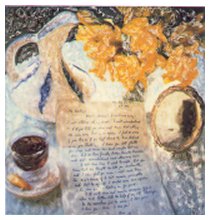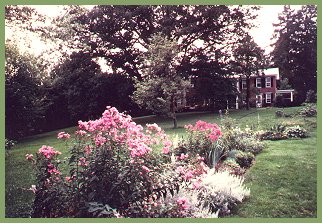 |
My Letter to the World August, 1999 |
 |
My Letter to the World August, 1999 |
 What
you see at left is not my garden -- nothing around here is quite that green
and healthy looking these days. I took this picture in 1984, on my first
visit to this garden. It's in Massachusetts, which is experiencing the
same drought conditions we in more southerly Pennsylvania are, so I'm not
sure that it still looks like this. But I'll soon find out -- I'm returning
Wednesday for an extended stay.
What
you see at left is not my garden -- nothing around here is quite that green
and healthy looking these days. I took this picture in 1984, on my first
visit to this garden. It's in Massachusetts, which is experiencing the
same drought conditions we in more southerly Pennsylvania are, so I'm not
sure that it still looks like this. But I'll soon find out -- I'm returning
Wednesday for an extended stay.
The garden belonged once to Emily Dickinson, the 19th-century New England poet whose work gives this section of my journal its name. That's the Dickinson Homestead in the background. The occasion for my visit is the annual convention of the Emily Dickinson International Society -- four days of peace, love, and academic papers concerning this enigmatic genius about whom so much has been written.
Contrary to what a lot of my former students believe about me, I was not born an Emily Dickinson fan. Rather, I grew into my passion for her, learning my way through the myths and the standard analyses to the intimacy I feel with her now.
A ninth grade English assignment asked me to propose an intangible gift for a celebrity. I quoted "I'm Nobody! Who are you?" and suggested that anonymity might be treasured by Jacqueline Kennedy and her children, who were even then (1962) hounded by "an admiring bog." In college I studied Dickinson in an American literature survey course, but if the notes I wrote in my Norton text are any indication, she was no more intriguing to me then than were Walt Whitman and Robert Frost. A few years later I scrawled a large "Amen!" and the name of the man who had broken my heart for the second time in the margin beside "My life closed twice before its close." This, however, is the only indication that I believed this poet had anything of personal significance to say to me.
Over the course of my teaching career, as I led class after class through the riddlesome territory that even her widely-anthologized poems present, I developed a keen awareness that Emily Dickinson was indeed a special voice that could be heard in myriad ways and whose message went beyond that of a girl disappointed in love.
In August of 1984, through circumstances which the poet herself would appreciate as "a happen," I found myself in Amherst, Massachusetts. A horse my husband had once owned was competing at the New England Morgan Horse Show, and we decided at the last minute to take a short vacation to see Merlin Highwayman step through his paces. The show had attracted so many visitors that every hotel room in Northampton was booked. But there was a room at the inn in Amherst, eight miles out Route 9.
On Tuesday, High would not be showing until evening. We spent the morning browsing in the antique shops and used book houses on Amherst's pleasant Pleasant Street, and then, almost on a whim, we decided to take the tour of the Dickinson Homestead.
The house is part shrine and part functional living space -- visiting professors and guest lecturers stay there, so it presents a special mix of hallowed space and quotidian atmosphere. As soon as I walked in I felt something, well . . . haunting is the best word. There was something I couldn't name, some energy that moved on ahead of me and slipped around corners just as I was about to grasp its nature.
I moved along with my tour group. I peeked into the kitchen. I stood in the drawing room. I climbed the stairs, moved into her bedroom, and passed my hand along the edge of her writing table. And, just as the others filed out and I was left alone in the place where her genius had bloomed, I reached into the closet and touched the hem of her garment. In that electric instant some portion of the spirit of Emily Dickinson entered my body and dwells there still.
If you came to this piece through a search engine query on "Emily Dickinson," you have probably not found the academic help you were looking for. Nor should you. Like my piece explaining the Robert Frost reference, these paragraphs are more about me than they are about the poet. As with any great literature, you must grapple with the mysteries on your own. If Emily Dickinson has anything to say to you, you will hear it. If she doesn't, nothing I could write will help.
This journal updates irregularly.
To learn when new pieces
are added,
join the Notify
List.